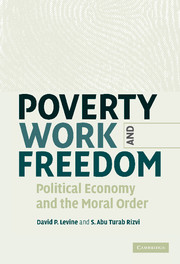2 - The classical period
Published online by Cambridge University Press: 22 September 2009
Summary
Around the time economics as a coherent body of thought was emerging, there was a change in the perception of the poor. This came near the end of a long development. R. H. Tawney describes this change as a shift between the medieval “conception of society as a community of unequal classes with varying functions, organized for a common end” and the modern idea of society “as a mechanism adjusting through the play of economic motives to the supply of economic needs” (1962: 13).
It is possible to argue against the simplicity of Tawney's picture. The chasm may not have been as wide as he imagined or its beginning and ending points located exactly as he stated. Nevertheless, as Gertrude Himmelfarb suggests, to deny the gap “entirely is, in a sense to affirm it.” The claim that society is and always was nothing more than the sum of the strivings of individuals in the material world, that the economy is and was independent from and never subjugated to other motives and standards, is a “peculiarly modern way of thinking, patently at variance with the beliefs most people lived with for most of history” (Himmelfarb 1983: 23–24).
Tawney found the origin of this change in thinking in the sixteenth century with the spread of commercial agriculture. It continued and hastened with the spread of industrial activity after that time. He located the new ethic in the teachings of Puritanism, which diverged sharply in many respects from medieval beliefs.
- Type
- Chapter
- Information
- Poverty, Work, and FreedomPolitical Economy and the Moral Order, pp. 13 - 28Publisher: Cambridge University PressPrint publication year: 2005



